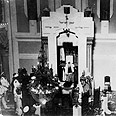

Settling debts with Gaddafi
As Italy agrees to revolutionary compensation package over its occupation of Libya during WWII, Jews of Libyan descent launch initiative to receive their part in compensation package – over $500 million. 'My aunt was sent to death camps. We're entitled to compensation,' says Itzhak Cohen
From afar, the pile of documents on the desk of Libya's President Muammar Gaddafi may look like just another bureaucratic list that the ruler can doodle on as he continues with his daily agenda. But these documents hide a story that involves senior Libyan, Italian, American and Israeli government officials.
A few weeks ago, an unusual secret meeting took place at the United Nations offices: On one side, a close associate of Gaddafi's, and on the other, an American Jewish lawyer. The agenda: Deliberations over an operation materializing as we speak – 400 million euros ($529,389,440) compensation being requested by Libya's 120,000 Jews, mostly Israeli residents, for years of suffering under Italian rule.
Alan Gershon, the lawyer hired by the Libyan expats, held the position of legal advisor to the US mission to the UN, and has already succeeded in making the Libyan government pay huge sums in compensation to the families of those killed in the 1988 Pan Am flight terror attack over Lockerby in Scotland.
Jews of Libyan descent decided to act after Berlusconi's government signed an agreement stating that it would pay Libya 5 billion euro ($6,617,368,000) – compensation for the Imperialist regime of 1911-1943.
Gershon, who together with former Knesset Member and lawyer David Mena and a group of Italian lawyers is representing the Jews in the affair, is demanding the money from Italy and not Libya. Former Italian foreign minister and Jewish Italian parliament members from Berlusconi's party were enlisted for the mission.
Their main claim is that Jews weren't just like everyone else among the conquered; rather they suffered from the Italian rule under Benito Mussolini more than the Muslims. They were sent to work camps, evicted from their homes, suffered under the 'Shabbat Laws' which forced them to work on Shabbat and some were even sent to concentration camps and murdered in the Holocaust.
"We were among the conquered, we suffered more and so we want our share of the compensation," said Chairman of the International organization for Jews of Libyan Descent Meir Kahlon. "We will not ignore the fate of the dozens of Libyan Jews murdered during the Italian regime's rule.
Joined by the team of lawyers, Kahlon formed an agreement that outlines the plan. "The operation will focus at first on the Libyan government, for an understanding that part of the compensation funds were meant for the Jews." The agreement stated.
"This will mainly be done in the US, without any noticeable Israeli activity but through the activities of Gershon and his team with the Libyan representative in Washington and the Libyan mission at the UN. At the same time we will ask international forums with connections to Libya, Gaddafi and his son to join the operation."
At the moment, the demands haven't been formed into legal action. "We will attempt to reach a settlement with the Libyan and Italian governments without involving the courts," said Kahlon. "The Italian ambassador has announced that they are willing to compensate Libya's Jews, but that the agreement must come from Libya."
The issue has already been brought to Gaddafi's attention, and conversations held in Italy reveal that there is no fundamental problem with the solution of reaching a settlement with Jews in Israel, so long as he gives his consent. It is no surprise then that the former Jewish Libyan community is all a flutter at the potential.
Libya heading west
The story is not a simple one – this is a community whose members weren't seen as Holocaust survivors for decades. It was only two months ago, nearly 60 years too late that the government offices finalized the addition of the 5,000 Jews of Libyan descent to those eligible for compensation according to the Nazi persecution disability law.
The move cost an estimated NIS 110 million ($30,540, 446). The eligibility of Libyan Jews is based on their exposure to Nazi persecution during WWII and their fearful escape from their homes. "The Jews suffered much more than the Muslims under Italian rule," said Deputy Finance Minister Itzhak Cohen, who is of Libyan descent. "My aunt was sent to the death camps with her children. We're entitled to compensation."
Kahlon and the other initiators are very much aware of the importance of the US in the move. They hired Gershon, who is experience in affairs like this, as their lawyer for a reason. The agreement states: "We appreciate that these days Libya needs US support and sympathy more than anything else, which is why the hub of our activities will be carried out by Gershon and his team, which has experience in dealing with the Libyan government, in the US.
It seems that the Lockerby terror attack families' compensation agreement, which Gershon oversaw, brought on an about-face in Libya's image around the world. "Libya wants to open up to the west" said a foreign ministry official, "and wants to promote relations in the US, where the main pressure to allocate compensation funds to the Jews according to their relative part in the population exists.
"Libya has given up its revolutionary image as the world's 'bad boy', has begun to develop relations with most of its sworn enemies, has given up weapons of mass destruction and has compensated the Lockerby attack families."
Following the activities in US, the operation will focus on the Italian government. Israel will also be included in this phase of the initiative, and members of the team have already me with Deputy Foreign Minister Danny Ayalon. In addition they are planning on requesting aid from the Israeli embassy in Rome, the Italian embassy in Israel a parliamentary organization and the 'Friends of Israel, Italy' organization.
Expectations in Israel are high. If received, the compensation isn't intended as personal compensation to the families. It will be used for infrastructure projects in Israel, "like the train to Eilat," says Cohen. The agreement would have the same terms as the one with Libya, where the funds from Italy would be invested in developing infrastructure in Libya over a 20 year period, through Italian companies.
Today, there are 16 Israeli towns that have large populations of Jews of Libyan descent; these include Porat, Dalton and Alma. Some are already dreaming of what they will do with the funds. "These towns need extensions, refurbishment, community centers and institutions and more," said Kahlon.
Never forget
Libyan Jews who lived through that difficult period find it hard to forget the history that led them to their quest for compensation. On the eve of WWII the Libyan Jewish community numbered 30,000. More than half resided in Tripoli, and a few thousand in Bengasi.
In 1935 the Shabbat Edict was put into force and Jewish merchants were all forced to keep their businesses open on the Sabbath. As Italy grew closer to Nazi Germany, racial and anti-Jewish laws were legislated in Italy. After Italy joined the axis in WWII, orders called for Jews to be locked up at the Jado concentration camp 150 kilometers from Tripoli, though this was only done partially.
The situation of Libya's Jews underwent a turn for the worse in June 1940 when the Fascist 'Black Shirts' group blamed them for hording food and spying for the British. After the British occupied Bengasi, the incitation against the Jews got worse. Many Jews were arrested and punished.
The end of WWII didn't bring about the end to their troubles. In 1945, right around the date of the one year anniversary of the Balfour declaration, riots against Libya's Jewish community left hundreds dead; many injured, and plundered synagogues in shambles.
Additional bloody clashes occurred in June 1948 as the Arab nations prepared to attack Israel. Between 1948 and 1952 nearly the entire Libyan Jewish community made Aliyah to Israel, other than a few that made their way to Italy.
Kahlon believes that an agreement to compensate the Jews will serve to improve Libya's standing in the world. And yet, they won't settle for anything less than what they are demanding. "We won't be bought cheaply" he added.
"It was hinted that they were willing to build us a luxurious nursing home, but that isn't a solution. We were seven percent of the population, and the compensation we receive should be allocated accordingly.
"We are interested in completing projects that would be for the State's benefit, and then we will settle our accounts with the Israeli government over funds for the benefit of the entire Jewish-Libyan community."
- Follow Ynetnews on Facebook















